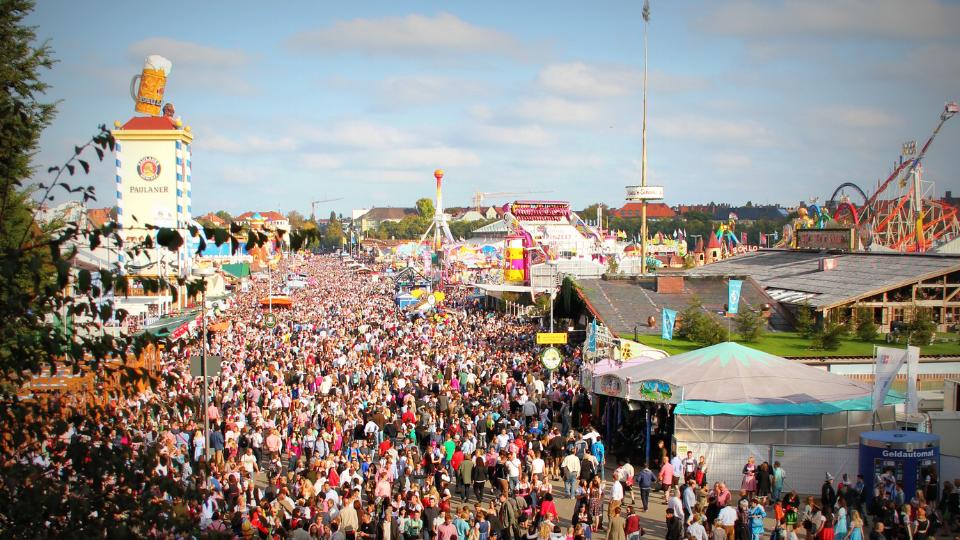
The leaves are changing, the air is crisp, and the sound of oompah bands fills the atmosphere — it can only mean one thing: Oktoberfest is here!
This annual Bavarian celebration, originating in Munich, Germany, has become a global sensation, drawing millions of beer enthusiasts and partygoers from around the world.
While the 2023 Oktoberfest (16th Sep – 3rd Oct) is undoubtedly a fantastic time to revel in German culture, sip on delicious brews, and indulge in hearty sausages…
It’s also essential to address a pressing concern: the environmental impact of the festival.
In this post, we’ll explore the merriment and mayhem of Oktoberfest, all while keeping an eye on sustainability.

Oktoberfest 2023 Facts and Statistics
- The 2023 Oktoberfest is one of the longest in history; lasting 18 days rather than the typical 16.
- Between 5-7 million people attend the festival in Munich alone with many more celebrating across the globe.
- Last year, 5.6 million litres of beer were consumed at the festival! – that’s enough to fill over 2 Olympic-sized swimming pools!
- This is the 186th Oktoberfest which has been taking place annually since 1810.
- Only 6 locally brewed beers are allowed to be drunk at the Munich festival. But don’t let that put you off drinking a Corona if that’s your preference when celebrating at home!
- The festival has used renewable electricity since 2012.
- Whilst it’s known worldwide, it’s attended largely by Bavarians who make up 72% of all guests celebrating the festivities.
- There are plenty of UK clubs and pubs putting on event nights for Oktoberfest so make sure to get involved where you can; dancing on tables and cheersing your stein glasses. Here are some events going on in London for example.
The Joy of Oktoberfest
Before we dive into the nitty-gritty of Oktoberfest’s environmental challenges, let’s take a moment to appreciate the joyous spirit of the festival.
Beer Galore
Oktoberfest is synonymous with beer, and Munich’s six major breweries serve up their finest lagers and ales.
Imagine sipping a massive stein of golden brew under the sprawling beer tents, surrounded by jubilant folks swaying to traditional Bavarian tunes.

Feasting Fit for a King
Foodies rejoice! Oktoberfest offers a smorgasbord of delectable treats, from pretzels the size of your head to mouthwatering sausages and schnitzels.
There’s no shortage of culinary delights to satisfy your taste buds.

Traditional Attire
Lederhosen for the gents and Dirndls for the ladies — Oktoberfest attire is a sight to behold. Don’t be surprised if you find yourself donning these charming Bavarian outfits during your visit.
The Not-So-Fun Side – Waste at Oktoberfest
While Oktoberfest promises endless fun and frolic, it also generates a considerable amount of waste. Let’s take a look at some of the environmental challenges faced by the festival:
Single-Use Plastics
With millions of visitors indulging in food and drink, it’s no wonder that single-use plastic items like plates, cups, and cutlery are prevalent.
These items often end up in landfills and oceans, contributing to pollution.
Despite efforts to use reusable products in the Munich festival, many events around the globe celebrating Oktoberfest will unfortunately use single-use plastics and other materials.
Waste Management
Oktoberfest’s massive crowds result in a significant amount of rubbish being discarded.
Managing this waste is a logistical challenge, but organisers are increasingly focusing on recycling and waste reduction efforts.
This year’s festival is expected to increase the amount of available bins on-site by an additional 15% in hopes of reducing litter.
Additional waste stream bins will also be used to successfully recycle individual materials such as glass and plastic.
Energy Consumption at Oktoberfest
Across the globe, celebrations of the festival will inevitably consume substantial amounts of energy from things like lighting, sound systems, carnival rides, transporting goods, and travelling party-goers.
Some initiatives have been taken to use renewable energy sources such as green electricity, but there’s room for improvement.
Oktoberfest in Munich alone used around 105,000 cubic meters of water, as well as 2.84 million kilowatt-hours of electricity in 2019 and this is expected to rise at the 2023 event due to more and more people attending.

2023 Oktoberfest Sustainability Efforts
Now, it’s not all doom and gloom. Oktoberfest organizers are taking steps to make the festival more eco-friendly:
- Reusable Beer Mugs: Some tents offer reusable beer mugs that you can return for a deposit. It’s a simple but effective way to reduce plastic waste.
- Waste Separation: Many tents now have recycling bins alongside regular trash bins, making it easier for visitors to dispose of their waste responsibly.
- Eco-Friendly Transportation: Encouraging the use of public transportation or bicycle rentals to get to the festival helps reduce carbon emissions.
In an attempt to reduce carbon emissions and improve the festival’s sustainability efforts, there have been numerous policies introduced over the last 10 years such as:
- Re-using water used to rinse beer glasses to flush toilets.
- Opting for electricity generated from renewable energy sources.
- And opting for reusable or recyclable products and packaging.
However, despite these efforts, the festival cannot be considered a sustainable event due to the sheer amount of methane and carbon emissions caused.
Research conducted by the Technical University of Munich found that during the festive period, 3x more methane gas was released into the atmosphere eclipsing the amount produced by the entire metropolitan area of Boston, New York!
Unfortunately, due to the masses of demand for meat and beer as well as the emissions caused by travelling guests, it remains a burden to the environment. More needs to be done.
Celebrating Oktoberfest at WasteManaged!
This year we celebrated Oktoberfest 2023 in style (and sustainably) with bratwurst, pretzels, decorations, costumes, and fun challenges throughout the day along with a company ‘town hall’ update from our senior leadership team. And after work a few beers, of course.
Here are some fun snaps from the day:


Conclusion
Oktoberfest is a fantastic celebration of Bavarian culture and a fun experience for anyone seeking a good time.
However, it’s vital to recognise the environmental challenges it poses and support sustainability efforts.
By enjoying the festival responsibly, you can savour the brews, bratwurst, and camaraderie while helping preserve our planet for future generations.
Prost to Oktoberfest and a cleaner, greener future!








